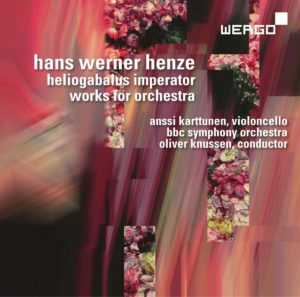Hans Werner Henze (1926-2012) thought nothing of trotting out gigantic orchestral forces in opulent splendor, sometimes to the point at which technical razzle-dazzle took precedence over musical substance. One case in point is Henze’s 1972 blockbuster Heliogabalus Imperator, revised in 1986 and recorded for the first time in 2014 with the late Oliver Knussen presiding. Subtitled “Allegoria per musica”, the work depicts the life and times of one of history’s most decadent Roman emperors.
Knowing the back story is totally irrelevant to understanding Henze’s ear-catching surface style. The first minute features chirping Messaien-like woodwinds against massed string tuttis that slide up and down with staggering unanimity. There are madcap percussive outbursts where rapid drum licks, cymbal crashes, and marimba flourishes hit you with the impact of an artist splattering buckets of paint onto a canvas. Yet Henze also tempers the collective din with strategic silences and effective unaccompanied first-desk solos.
When Georg Solti and the Chicago Symphony gave the work its 1973 New York premiere, New York Times critic Harold C. Schoenberg downplayed the music’s modernist leanings. He astutely described its colorful scoring and episodic momentum, adding that “it reminds one a little bit, though in a crazy, lopsided way, of Respighi’s Pines of Rome”.
Similarly, one does not need to know that Los Caprichos was inspired by a satirical painting of Goya in order to appreciate the composer’s deftly sophisticated wind and brass polyrhythmic juxtapositions, his long lines that feel rather than sound melodic, or those occasional moments of respite where the music slows down into an almost Copland-esque stillness.
Listeners not wishing to get started with Henze in meal-sized gulps may find the six diverse short movements comprising his Englische Liebeslieder for Cello and Orchestra a more plausible port of entry. Despite Henze’s customarily dense orchestration, Anssi Karttunen’s effortless dispatch of the solo part’s formidable challenges (impossible double stops, exposed lyrical writing above the staff, etc.) is never buried in the mix, thanks to Knussen’s expert contouring of textures. And for those on a tight schedule, Henze’s final orchestral work, Ouverture zu einem Theater, basically scales the composer’s no-holds-barred instrumental palette and gestural grandiosity down to an easily palatable four-and-a-half-minute time frame. Henze may have overestimated his place in history, yet Knussen and musicians unquestionably make the best possible case for these three compositions.
































